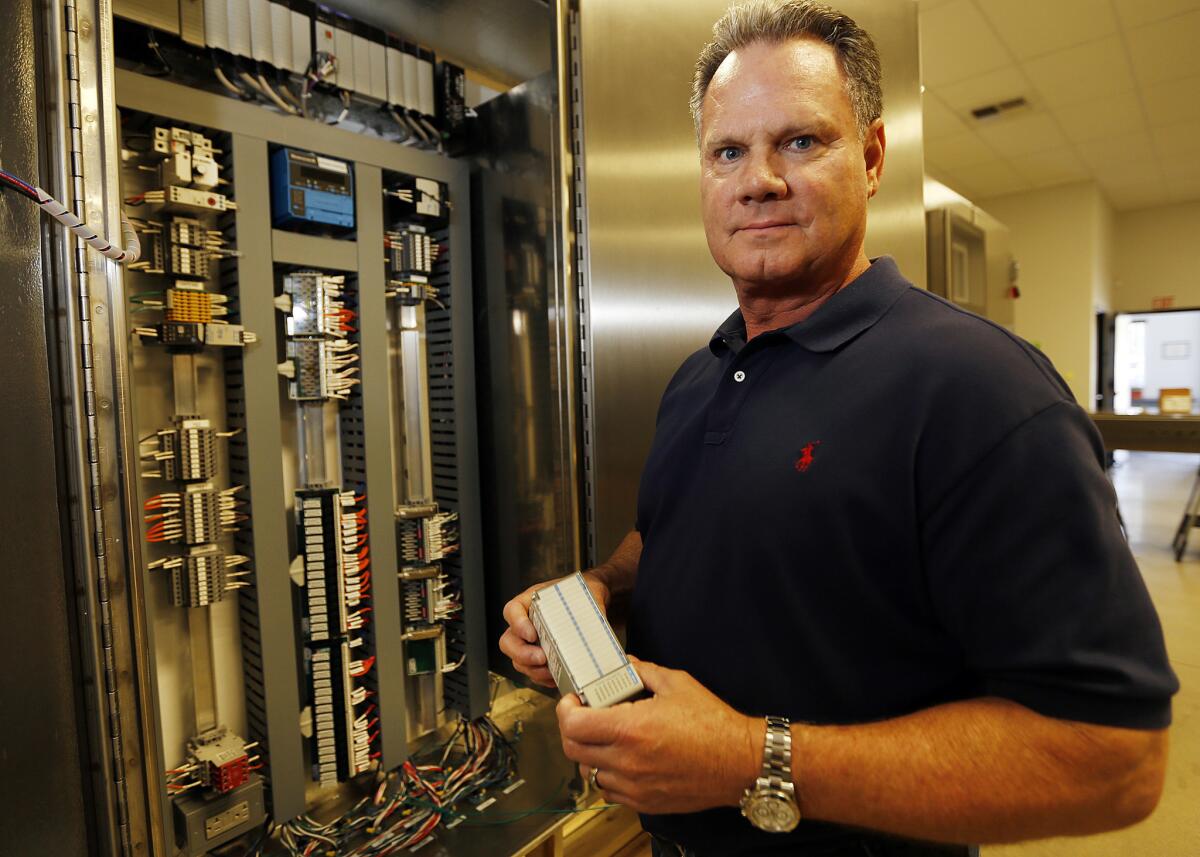Bid to revive Export-Import Bank gets a boost

Don Nelson, chief executive of ProGauge Technologies Inc., is awaiting word on a bid for a project in the Middle East. If the company wins, he will do most of the work in the unnamed nation because it would be too expensive to obtain the required delivery guarantee without the help of the Export-Import Bank.
- Share via
REPORTING FROM WASHINGTON — Mounting job losses and a surprise political development are creating what may be another chance to revive a federal agency that fosters U.S. exports.
The shutdown of the Export-Import Bank on July 1, once expected to be short-lived, has been looking more like a permanent victory for conservative Republicans in the House who want to kill off the agency, even though a majority in Congress support it.
Business, too, has backed the bank’s reauthorization. But until that happens, a growing number of companies are taking steps that will reverberate through the economy. General Electric Co. this week said it would shift 350 jobs to Canada to take advantage of export financing there.
That and House Speaker John Boehner’s (R-Ohio) decision to resign last week have bipartisan bank supporters hopeful. They’re pushing to reopen the bank in Boehner’s final round of deal-making before the damage gets too bad.
The clock is ticking because a declared foe of the agency, House Majority Leader Kevin McCarthy (R-Bakersfield), is the favorite to succeed Boehner.
“The time to act on a path forward is now, before even more jobs are put in jeopardy,” said Rep. Stephen Fincher (R-Tenn.), a leader in the House push for the bank’s reauthorization.
On Tuesday, Rep. Maxine Waters (D-Los Angeles) told her colleagues: “Every day that this Republican-led House refuses to act is another day that American workers suffer the consequences.”
She and other bank supporters tried to use a parliamentary maneuver to force a vote on reauthorizing the bank, but the effort failed.
Some conservatives continue to turn a deaf ear to companies that use the bank. McCarthy reiterated his opposition as he announced his run for speaker Monday, telling Fox News that he fought hard to shut down the bank and that he will “continue to fight” to keep it closed.
The decision by GE, its second this month, and actions by other large and small companies are paving a way to conduct business in a world without the Export-Import Bank — a world in which U.S. jobs are permanently lost.
GE said it was moving the jobs from a Wisconsin gas-engine factory to a new facility in Canada so the company’s customers would be able to tap into that country’s export-finance agency. Barely two weeks ago, GE said it was shifting 500 jobs from four U.S. states to Europe and China to make the production of turbines and generators eligible for export aid from those countries.
Last month, Boeing Co., said it could lay off several hundred employees at its Southern California satellite division because a customer that needed Export-Import Bank financing had canceled an order.
ProGauge Technologies Inc., a small Bakersfield manufacturer of oil industry equipment, is awaiting word on a bid for a multiyear project in the Middle East worth as much as $40 million.
Chief Executive Don Nelson said that if the company wins, he will do most of the work in the unnamed nation because it would be too expensive to obtain the required delivery guarantee without the help of the Export-Import Bank.
A guarantee from the agency requires 25% collateral. One from a private bank requires 100% collateral, which he said he can’t afford.
“The reason they make you put up the guarantee is they put the money upfront and they want to make sure they get the equipment,” he said of the buyer. “If we fabricate 10 minutes from where they are, in their country, that risk goes away.”
The downturn in the oil industry has led to about a dozen layoffs recently at ProGauge, which now has 58 employees. Nelson estimated the new project would create 30 jobs — but only five of those would be in the U.S.
“It’s pretty sad to not be able to keep the jobs here,” Nelson said.
The Export-Import Bank was started during the Great Depression to help U.S. companies in selling their products overseas. At least 59 other countries have similar agencies, which provide loans and other assistance for products manufactured domestically.
Last year, the U.S. agency provided $20.5 billion in assistance that financed $27.5 billion in U.S. exports. That amounted to less than 2% of $2.4 trillion in total U.S. exports last year. Funded through interest and fees, the bank sent $675 million in profits to the U.S. Treasury last year.
Many conservative Republicans said the bank’s aid amounted to corporate welfare, mostly helping large companies such as GE and Boeing while harming domestic competitors, which can’t get export financing for various reasons. Opponents also worry that taxpayers are at risk for any losses the bank can’t cover on about $112 billion in outstanding assistance.
“While there’s no doubt some U.S. companies receive a benefit from Ex-Im, there’s also no doubt Ex-Im hurts other American companies and their workers,” said Rep. Jeb Hensarling (R-Texas), a leading bank opponent. “Where is the fairness in giving Washington politicians the power to pick who gets helped and who gets hurt?”
President Obama and bipartisan majorities in the House and Senate — most Democrats and many pro-business Republicans — support the bank. But House Republican leaders did not allow a reauthorization vote in June, and the bank’s charter expired.
The bank can no longer offer new assistance but can continue to service existing loans.
Backers, including the U.S. Chamber of Commerce and the National Assn. of Manufacturers, hoped the bipartisan support would allow the bank’s reauthorization to be attached to a must-pass highway funding bill in July. Even Boehner lamented that the sudden closure of the bank would cost U.S. jobs.
But pushed by conservative activists, he and other House Republican leaders held firm on the closure before leaving for their summer recess. In the ensuing weeks, businesses said they have reassessed the chances for reauthorization.
“We were hopeful, but it certainly became clear in the last 60 days it was going to be a much tougher struggle,” said John Rice, GE’s vice chairman.
Many countries require government export assistance for power-plant and other projects, he said.
GE is bidding on $11 billion worth of such projects and needs to make the equipment in countries with export-assistance agencies to be eligible, Rice said.
“They think it’s our choice. Big GE or big Boeing can suck it up and provide the financing themselves,” Rice said of bank opponents. “No, you can’t.”
Companies move jobs out of the U.S. for many reasons, including lower taxes, said Dan Holler, a spokesman for Heritage Action for America, a conservative group that has helped lead the opposition to the bank. GE, for instance, already has 7,000 employees in Canada, which has a much lower corporate tax rate than the U.S., he said.
Boehner announced his resignation last week amid discontent from hard-right conservatives. But before he leaves at the end of October, he could cut deals with Democrats and the White House on the budget and highway funding that could include the bank’s reauthorization.
But bank opponents promised to fight any attempt to revive it.
“Conservatives have accomplished something they promised to do for a decade, which is shut down a government agency,” Holler said. “All we have to do is make sure Republican leadership doesn’t undo the victory.”
[email protected]
More to Read
Inside the business of entertainment
The Wide Shot brings you news, analysis and insights on everything from streaming wars to production — and what it all means for the future.
You may occasionally receive promotional content from the Los Angeles Times.











